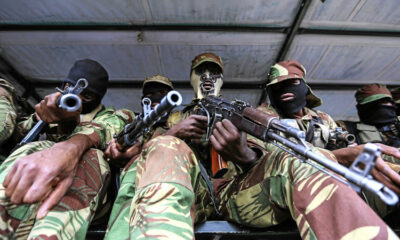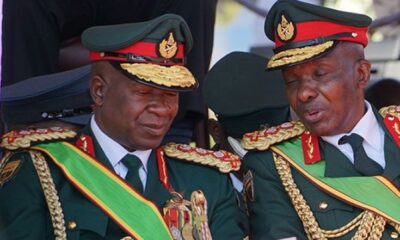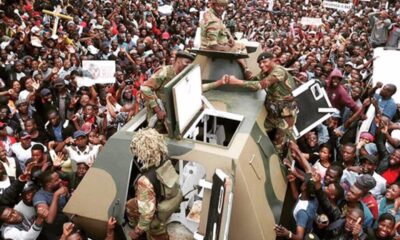THE recent spate of robberies involving security forces is a worrisome development in Zimbabwe and the authorities should act swiftly to weed out rogue elements from society, analysts have said.
NYASHA CHINGONO
The integrity of the security forces has come under the spotlight after several elements were involved in robberies this year.
While some of the foiled robberies turned fatal, it remains worrisome that the security forces who have pledged to protect citizens have become part of a racket of lawlessness.
In February, four suspected robbers, including a police officer, were involved in a fatal shootout in central Harare. Again in July, a member of the Presidential Guard was shot by and fled with a bullet lodged in his rib cage after robbing a Chitungwiza service station of cash, a firearm and other valuables.
Home Affairs minister Kazembe Kazembe in April made an embarrassing admission that most robberies were being committed by police officers and soldiers.
“It is, indeed, true that most of these cases of armed robberies are being done by armed men and women from the police force as well as the army. I would like to emphasise and indicate that government is, indeed, working on that, but I would also like to indicate that such cases have decreased,” Kazembe said then.
Kazembe failed to proffer a lasting solution to the cancerous behaviour of the security forces. The recent robbery case involving former police constable Francis Takura (33), and Zimbabwe National Army (ZNA) private Virimai Nyandoro (37), who have since been arrested, is a tip of the iceberg highlighting that some trained security personnel have turned rogue.
Three robbers identified as Brian Koga Tendere (38) of Chikupo village in Murewa, soldier Charles Chirara (30) of Ushewokunze suburb in Harare, and Tariro Gora (21) of 1 Commando Barracks, were shot dead by former detective Joseph Nemaisa in movie style.
Although the foiled robbery was a case of mistaken identity, it is clear the rot in the security services needs to be stamped out in a haste. Nemasai was hailed as the hero of the shootout, proving his prowess as a top marksman, but it is worrying how low the security services have sunk under the “New Dispensation.”
With robbery cases increasing in Zimbabwe, the common denominator remains former and serving security personnel.
Their knowledge of the use of firearms and security protocols places them right at the centre of the growing problem. They also have easy access to weapons. Working in cahoots with daring civilians and informants, businesspeople have become sitting ducks for robbers.
Preying on the rampant public mistrust in the financial system which has seen businesspeople, families and individuals keep large sums of money in homes, armed raids have risen over the past few years. Coupled with the growing economic hardships, with security forces reeling from poor salaries and deteriorating standards of living, some desperate elements think robberies are the easy way out. Once decently paid, police and army officers have become paupers in Zimbabwe, taking home paltry salaries insufficient to cater for their families.
Having played a major role in the 2017 coup that toppled longtime dictator Robert Mugabe, some sections of the military are generally disgruntled over worsening livelihoods. They feel President Emmerson Mnangagwa sold them a dummy. But the deteriorating economy and poor salaries are not an excuse for lawlessness. No one is above the law and the security forces should stick to their pledge to serve the nation.
“One cannot rule out economics, but there are rogue elements,” political analyst Ibbo Mandaza said.
He said the government should be worried by the unholy alliance between robbers and security forces.
“It is frightening and the powers that be should be worried. They should be stamped out because the line between criminality and security is very thin,” he said Mandaza added that the robbers could be used to mete out politically motivated violence and murders if the government does not intervene.
“These people could be used by other elements who want to dispose of other people,” Mandaza added.
Political analyst Stephen Chan said the involvement of the police and army in robberies was common but could culminate in a security risk if not nipped in the bud.
“In almost every country in Africa, Latin America, and South Asia, when security and police forces are frequently involved with crime, especially robberies, this is an indication both of a culture of impunity, but also of poor conditions of service,” Chan said.
He however said the rise in the robbery cases would threaten the present government in the future. “But these are also warning signs. In many cases, the next step is for these forces to turn against the government,” Chan said.
Who will protect the citizens if rogue elements are roaming the streets with dangerous weapons? It is also worrying that those who pledged to protect the law can violate it at will.
“Let me say when people are being enrolled in the police force, they take oaths that they will discharge their duties. We do not expect them to complain when they are in the system. Even if we are to give them 50- fold salaries, will they abide by the rules and regulations governing the police force?” Kazembe said in April.
Although the long arm of the law is expected to catch up with such elements, the terror and trauma inflicted on unsuspecting families like what happened to Nemaisa’s family shows a cancerous behaviour bedevilling our society.
There is a need to rid the security sector of rogue elements who are terrorising families and preying on innocent citizens. An urgent inquiry into why more security personnel are involved in robberies is required.

















